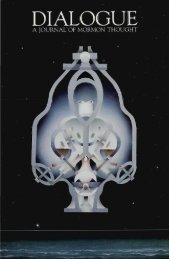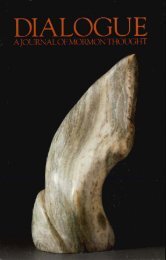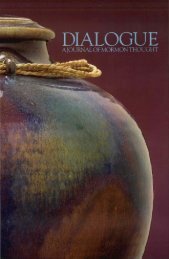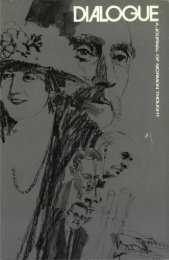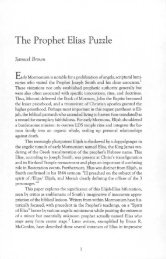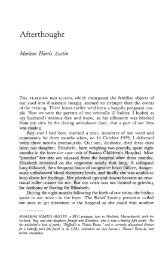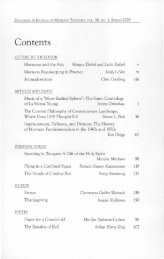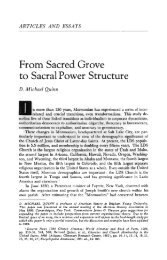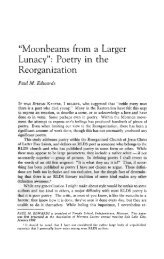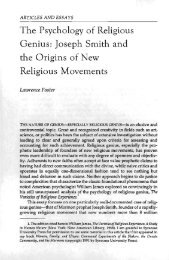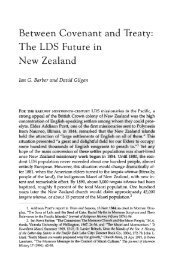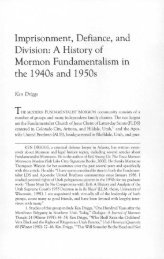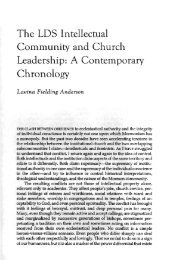Dialogue, Volume 25, Number 2 - Dialogue – A Journal of Mormon ...
Dialogue, Volume 25, Number 2 - Dialogue – A Journal of Mormon ...
Dialogue, Volume 25, Number 2 - Dialogue – A Journal of Mormon ...
You also want an ePaper? Increase the reach of your titles
YUMPU automatically turns print PDFs into web optimized ePapers that Google loves.
80 DIALOGUE: A JOURNAL OF MORMON THOUGHT<br />
prolonged chemotherapy. Medical pr<strong>of</strong>essionals advised her to terminate<br />
the pregnancy. Though both Church counsel and reason reassured<br />
her this was an acceptable way to save her own life, she furiously<br />
rejected such a course <strong>of</strong> action. Over several weeks she wept, consulted<br />
authorities, and prayed. Finally she had an experience in which<br />
she saw an image <strong>of</strong> herself interacting with her posterity and pr<strong>of</strong>oundly<br />
regretting the absence <strong>of</strong> one lost child. The image helped to<br />
clarify her path. She chose neither abortion nor chemotherapy; eight<br />
months later she gave birth to a large, healthy boy, her cancer in complete<br />
remission.<br />
I do not see this an anti-abortion story. Instead it affirms the reality<br />
<strong>of</strong> the Spirit, even and perhaps especially for women in anguish<br />
about their roles as mothers. Women, too, are heirs to the gifts <strong>of</strong><br />
heaven; it is a woman's privilege to defy "reason," conventional wisdom,<br />
or male authority, and to hold fast to her inner sources <strong>of</strong> light.<br />
Stories like this one belong in the Ensign, in Relief Society manuals, at<br />
the General Conference pulpit —as do all the essays recounted here,<br />
and myriad others written in my classes and elsewhere, and those as<br />
yet unwritten. For the Latter-day Saint, writing personal essays like<br />
these yields the rewards <strong>of</strong> pleasure; an increased sense <strong>of</strong> a valid<br />
place in the community; the opportunity to participate in the "great<br />
story," either conservatively or radically; and the chance to heal, teach,<br />
and inspire. Personal essays make available the "little story" and<br />
empower readers and writers to live fuller, more productive lives.<br />
To overcome two obstacles to receiving these rewards —lack <strong>of</strong> time<br />
and lack <strong>of</strong> knowledge — LDS women (and men) can take classes, ask<br />
for or make for themselves protected time, and form writing and reading<br />
groups. They can make solitary commitments to write, read, and<br />
honor the personal writing <strong>of</strong> other women (and men). Writers can<br />
enter the essay contests <strong>of</strong>fered by Exponent II and the Ensign, submit<br />
work to LDS and non-LDS publications, and require that more illustrative<br />
stories in Relief Society manuals be by and about women. But<br />
in order for that to happen, <strong>of</strong> course, the stories need to be discovered<br />
and written.<br />
Overcoming fear, the third obstacle to producing personal narrative,<br />
may take more concentrated effort. It helps to know that even<br />
pr<strong>of</strong>essional writers feel fear when faced with the task <strong>of</strong> writing personal<br />
narrative. When Bulgarian linguist and psychoanalyst Julia<br />
Kristeva was asked to contribute a brief sketch to a book <strong>of</strong> women's<br />
autobiography, she protested that it is nearly impossible to write about<br />
one's own life accurately: "The disturbing abyss between 'what is said'<br />
and undecidable 'truth' prevents me from being a good witness," she<br />
said (1987, 219). But, in spite <strong>of</strong> her discomfort, ultimately she agreed.



